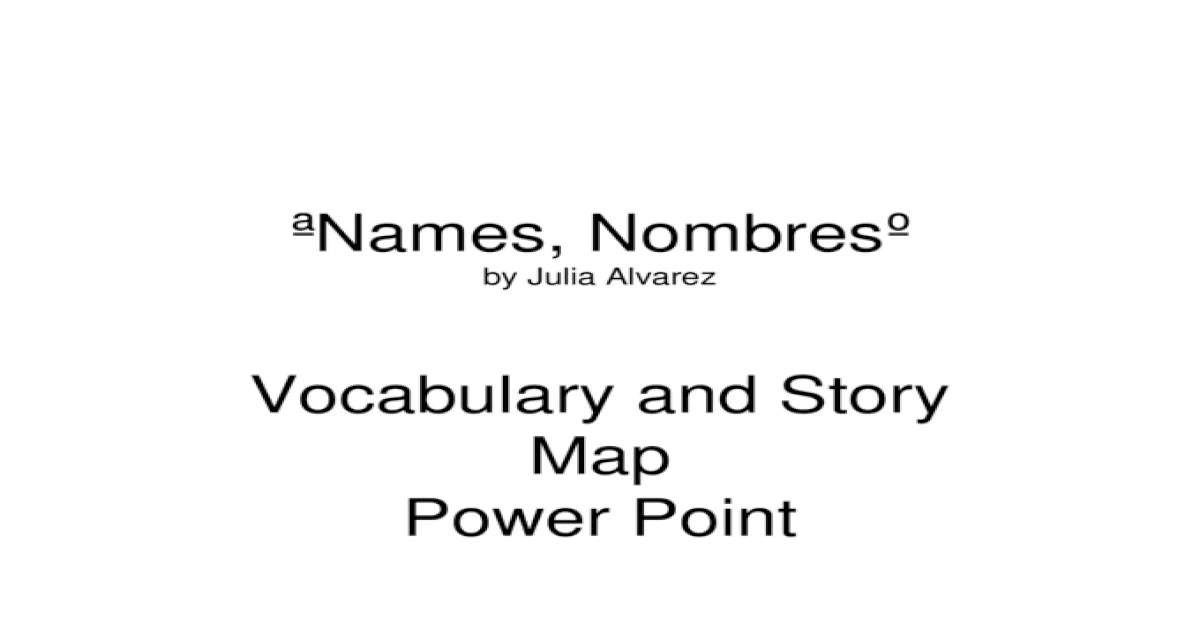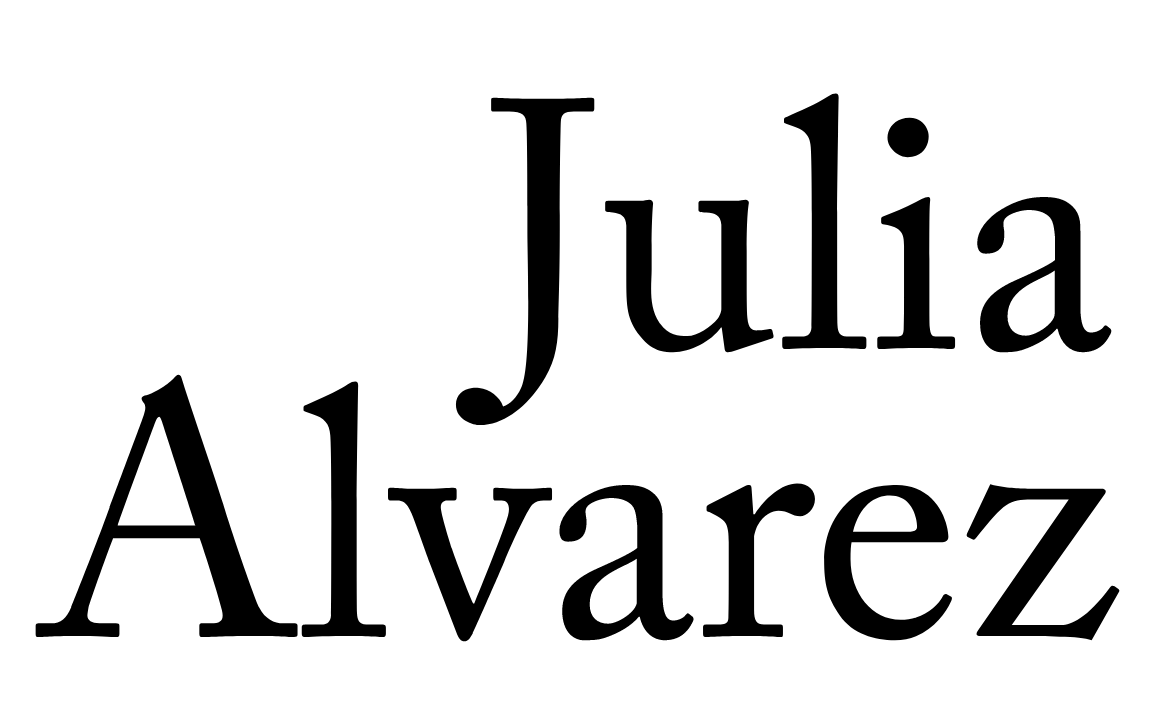Name nombres by julia alvarez – In Julia Alvarez’s poignant poem “Names/Nombres,” readers are invited to delve into the intricate tapestry of names and their profound impact on our identities, cultural heritage, and societal norms.
Through a masterful blend of free verse, symbolism, and personal anecdotes, Alvarez unveils the complexities of naming practices, their role in shaping relationships, and their ability to both preserve and challenge cultural traditions.
Themes in “Names/Nombres”

Julia Alvarez’s poem “Names/Nombres” explores the profound significance of names and naming practices within a cultural and historical context. Names serve as more than mere labels; they shape identities, forge connections, and reflect the complex interplay between personal and collective experiences.
Cultural and Historical Context
In many cultures, names carry deep-rooted meanings and traditions. They may honor ancestors, commemorate significant events, or reflect religious beliefs. Alvarez highlights the power of names to connect individuals to their heritage and community. For example, the speaker’s grandmother’s name, “Esperanza,” embodies the hope and resilience of her people.
Identity and Relationships
Names play a crucial role in shaping personal identity. They can reflect our aspirations, values, and experiences. The speaker in “Names/Nombres” grapples with the complexities of her own name, which embodies both her Dominican heritage and her American upbringing. Through the exploration of names, Alvarez delves into the multifaceted nature of identity and the ways in which names both define and transcend cultural boundaries.
Structure and Form of “Names/Nombres”: Name Nombres By Julia Alvarez

Julia Alvarez’s “Names/Nombres” is a free verse poem that explores the themes of identity, language, and culture. The poem’s structure and form contribute significantly to its meaning, as they reflect the fragmented and complex nature of the speaker’s experience.
The poem is written in free verse, with no regular meter or rhyme scheme. This gives the poem a sense of spontaneity and immediacy, as if the speaker is speaking directly to the reader. The lack of formal structure also allows Alvarez to focus on the poem’s content rather than its form, which emphasizes the importance of the speaker’s experiences and emotions.
Use of Repetition
Alvarez uses repetition throughout the poem to create a sense of rhythm and emphasis. The repetition of certain words and phrases, such as “names” and “nombres,” helps to reinforce the poem’s themes of identity and language. For example, the line “I have been called many names” is repeated several times throughout the poem, highlighting the speaker’s struggle to find a single, definitive identity.
Use of Imagery
Alvarez also uses imagery to create a vivid and sensory experience for the reader. The poem is filled with images of the Dominican Republic, the speaker’s homeland, such as “the green of sugarcane” and “the smell of mangoes.” These images help to create a sense of place and to evoke the speaker’s memories and emotions.
Use of Symbolism
Alvarez also uses symbolism to explore the poem’s themes. For example, the use of the color white in the line “I am the white of this page” symbolizes the speaker’s desire to be seen and recognized. The color white is often associated with purity and innocence, which suggests that the speaker wants to be seen as her true self, without the prejudices and stereotypes that have been imposed on her.
The novel “Name Nombres” by Julia Alvarez explores themes of identity and the search for belonging. Alvarez’s writing is both lyrical and accessible, capturing the complexities of the immigrant experience. However, if you’re looking for a hair care product that’s free of harsh sulfates, is Lanza shampoo sulfate free ? This is a question that many people have, as sulfates can be irritating to the scalp.
Back to the topic of “Name Nombres,” Alvarez’s novel has received critical acclaim for its honest and moving portrayal of the immigrant experience.
Cultural Identity in “Names/Nombres”

Julia Alvarez’s “Names/Nombres” explores the complexities of cultural identity through the lens of language and naming. The poem delves into the tension between assimilation into a new culture and preserving one’s heritage.
Assimilation and Preservation
The poem’s speaker, a Dominican immigrant in the United States, struggles with the desire to fit in while also honoring her cultural roots. She grapples with the temptation to change her name to an Americanized version, recognizing that it could ease her integration into society.
However, she also feels a deep connection to her Dominican heritage and the name that embodies it.
- The speaker’s mother insists on using her daughter’s Dominican name, Inocencia, despite its unfamiliar sound to American ears.
- The speaker’s father, on the other hand, suggests changing her name to “Ana,” a more common American name, to help her assimilate.
Language and Identity
Language plays a crucial role in shaping cultural identity in the poem. The speaker’s Dominican Spanish is a symbol of her connection to her homeland and her family’s history.
- The speaker describes her Spanish as “the language of her dreams,” emphasizing its emotional and cultural significance.
- She also acknowledges the challenges of navigating a world where English is the dominant language.
The poem ultimately suggests that cultural identity is a fluid and multifaceted concept, shaped by both assimilation and preservation. The speaker embraces the complexities of her identity, finding strength in both her Dominican roots and her American experiences.
Gender and Power in “Names/Nombres”

In “Names/Nombres,” Julia Alvarez explores the intricate relationship between gender and power, particularly in the context of naming practices. The poem sheds light on how societal expectations and gender norms influence the names we receive, the identities we form, and the power dynamics that shape our lives.
Representation of Gender Roles
Alvarez portrays a clear distinction between male and female gender roles. Men are often associated with strength, dominance, and authority, while women are depicted as nurturing, passive, and subordinate. This dichotomy is evident in the names given to each gender.
For example, the male characters in the poem possess names that reflect power and status, such as “Don” and “Padre.” In contrast, the female characters bear names that emphasize their domestic roles, such as “Mama” and “Tia.”
Power Dynamics in Naming
The power dynamics associated with naming are also explored in the poem. The act of naming is often seen as a way to assert authority and control. In “Names/Nombres,” the patriarchal society grants the father the power to name his children.
This practice reinforces the idea that men hold the primary authority within the family and society. Moreover, the names chosen for girls often reflect the expectations placed upon them to conform to traditional gender roles.
Examples of Gender Influences on Naming Practices
- Male names often convey strength and authority, such as “Pedro,” “Juan,” and “Miguel.”
- Female names emphasize domesticity and nurturing, such as “Maria,” “Rosa,” and “Luisa.”
- Boys may receive names that reflect their fathers’ occupations, such as “Hijo del Carpintero” (son of the carpenter).
- Girls may be named after saints or other religious figures, emphasizing their expected role as pious and obedient.
- In some cultures, women may change their last name upon marriage, symbolizing their transition to a new patriarchal family.
Personal and Collective Memory in “Names/Nombres”

In “Names/Nombres,” Julia Alvarez explores the intricate connection between personal and collective memory through the lens of naming practices. Names serve as powerful vessels that carry both individual experiences and the shared history of a community.
Names as Preservers of History
Names have the ability to preserve and transmit history across generations. They often reflect the cultural, social, and political contexts in which they were bestowed. For example, in the poem, the narrator’s grandmother bears the name “America,” a testament to her family’s immigration journey and the hopes they carried for their new home.
Naming Practices and Collective Memory
Naming practices contribute to collective memory by creating a shared narrative that connects individuals to their ancestors and to the broader community. The names given to children often honor family members, commemorate important events, or reflect cultural values. By passing down names through generations, families and communities maintain a sense of continuity and belonging.
Personal Memories Embodied in Names, Name nombres by julia alvarez
Names also hold personal significance, embodying the unique experiences and identities of their bearers. The narrator’s own name, “Julia,” becomes a source of both pride and reflection as she explores her cultural heritage and her place in the world.
Names as a Bridge Between Past and Present
In “Names/Nombres,” Alvarez demonstrates how names serve as a bridge between past and present, connecting individuals to their personal and collective histories. Through the act of naming, we honor our ancestors, preserve our cultural traditions, and create a sense of belonging that transcends generations.
General Inquiries
What is the significance of names in “Names/Nombres”?
Names hold immense cultural and historical significance, shaping our identities, relationships, and sense of belonging.
How does the poem explore the tension between assimilation and preservation of heritage?
Alvarez delves into the complexities of navigating cultural identity, highlighting the challenges of balancing assimilation into a new culture while preserving one’s heritage.
What is the role of language and naming in shaping cultural identity?
Language and naming play a pivotal role in defining and transmitting cultural identity, connecting individuals to their heritage and shaping their understanding of the world.